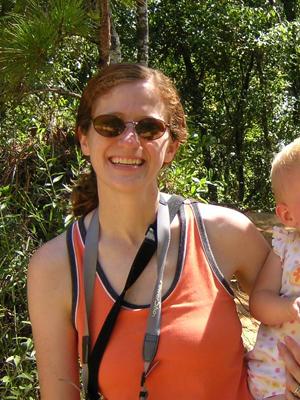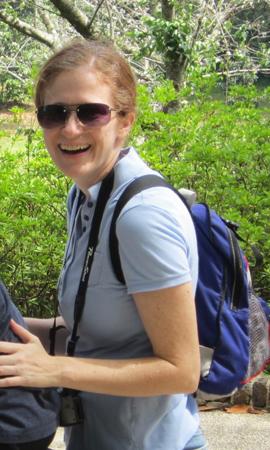Meet EPA Scientist Susan Yee, Ph.D.

Science for Sustainability
Susan Harrell Yee, Ph.D., is an ecologist at EPA's Gulf Ecology Division. She is currently working on the Puerto Rico Sustainable Communities program, where she is developing models and decision support tools to evaluate how alternative decisions impact provisioning of coastal ecosystem goods and services. She spends her spare time trying to keep up with her three young children.
How does your science matter?
For the past four to five years, I have been working on what we refer to as "ecosystem services." Those are the good things we get from healthy ecosystems, like recreational opportunities, aesthetic value, food, and clean water. Ecosystem services are an important concept because people don't often think about the benefits they're getting from their environment until they no longer have them. Additionally, those benefits should be considered by decision makers the same way that economic and social benefits are.
I think it is crucial to link the environment to things that people really care about, like being able to swim in unpolluted lakes and enjoying nature. That's where you're going to be able to make a difference.
That idea also applies to my work on the Sustainable Puerto Rico project. We're looking at different approaches that link management and policy decisions to changes in land-use and water quality, and how those decisions will lead to changes in ecosystem services. My role has been creating models that show how different decisions will affect the fate of the coral reefs, and consequently the local communities that depend on them, including economic opportunities from tourism and fishing, as well as the natural shoreline protection that coral reefs provide.
If you could have dinner with any scientist, past or present, who would you choose and what would you ask them?
Peter Kareiva, a chief scientist at The Nature Conservancy. I like that he is provocative and controversial, but the things he says really push ecologists to think about linking nature and ecology to human values and concerns. It comes back to the idea that we can't just go out and do conservation. Our work has to be linked to what people care about. Otherwise, decision makers aren't going to pay any attention to it. I'd like to ask him for feedback on my research and how it could be better.
What do you like most about your research?
I like the feeling that we're doing science that matters. Our research has real potential to help local communities and people.

Tell us about your background.
I got my Bachelors degree in Mathematics from Texas Tech University. While there, I did research in an ecology lab. I got my Masters in Mathematics from the University of Tennessee and my Ph.D. in Ecology at the University of Chicago.
When did you first know you wanted to be scientist?
Always! It's in my genes. My grandfather was a mathematician and my father was a scientist at the Department of the Interior and later, the Department of Energy.
If you were not a scientist, what would you be doing?
I like to cook. Maybe I'd be a chef, but I'd definitely need to go to cooking school!
Any advice for students considering a career in science?
If you have natural math ability, don't give up on it! There seems to be a myth, particularly among young women, that if you major in math you either have to go into accounting or be a math teacher.
I would really emphasize that, even if you don't major in math, quantitative skills are extremely important. Having a mathematical background will give you a huge advantage when looking for jobs, regardless of your other skills.
